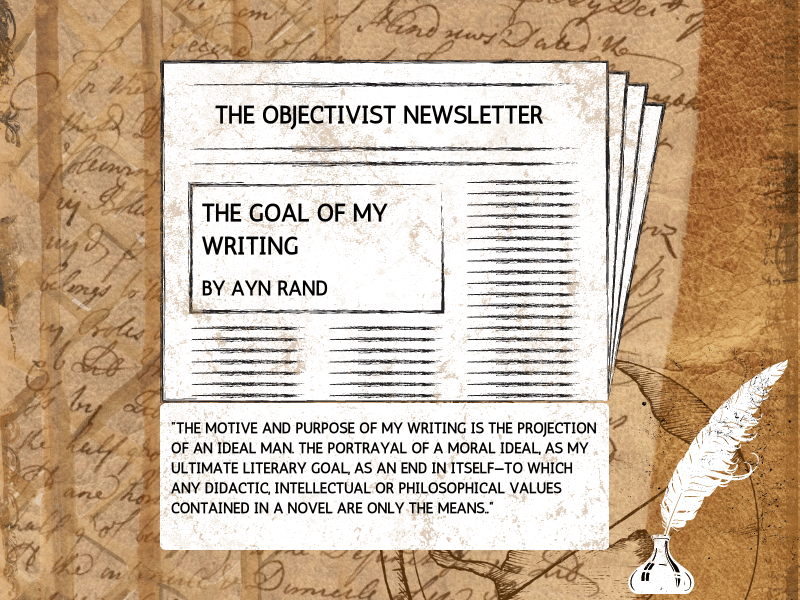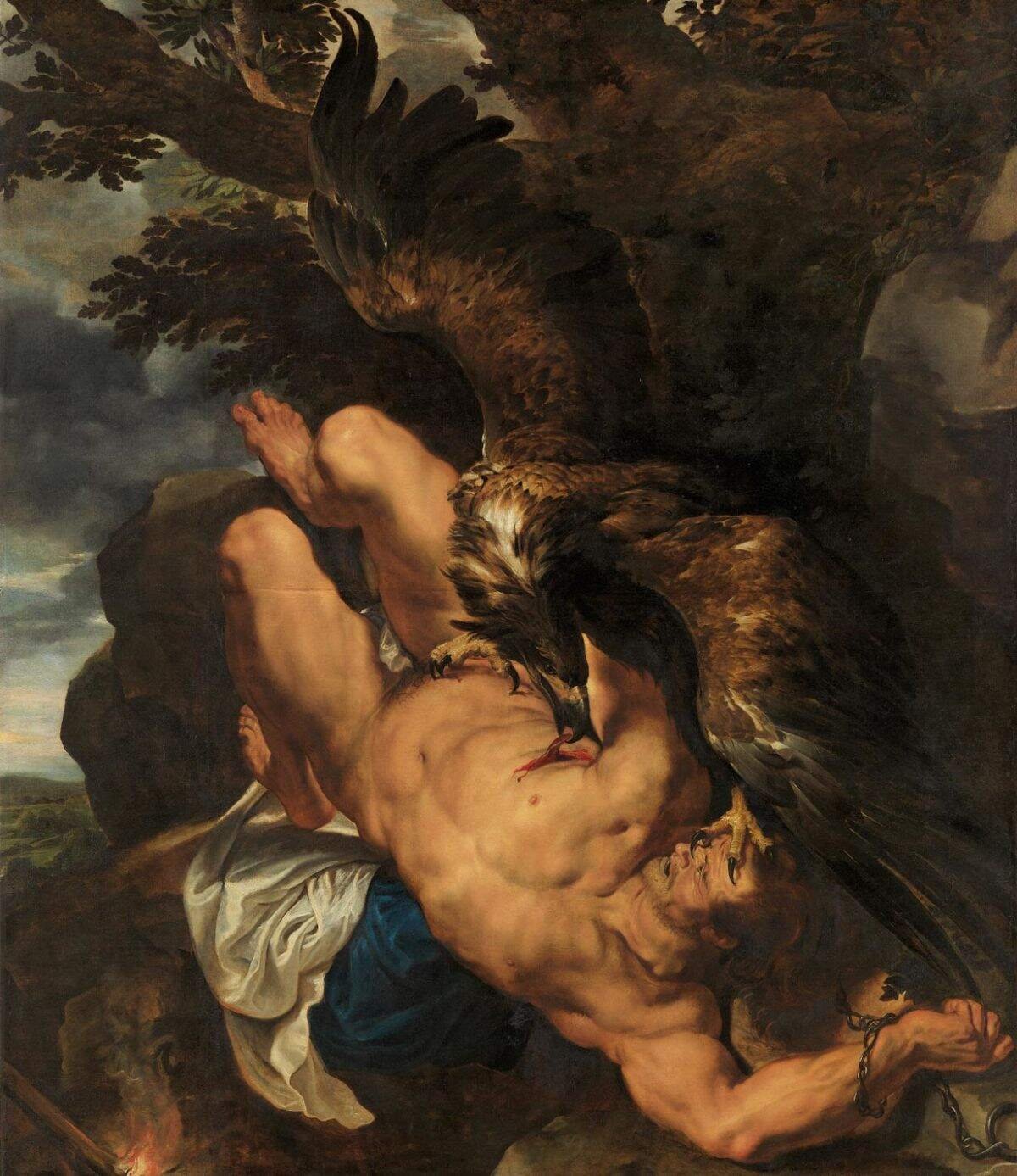A book and a beverage: Anthem and a layered latte
"The word ‘We’ is as lime poured over men, which sets and hardens to stone, and crushes all beneath it, and that which is white and that which is black are lost equally in the grey of it. It is the word by which the depraved steal the virtue of the good, by which the weak steal the might of the strong, by which the fools steal the wisdom of the sages." – Ayn Rand, Anthem
Synopsis
Anthem by Ayn Rand is a dystopian novella published in 1958 that follows the life of “Equality 7-2521” (the characters have numbers instead of names, and singular pronouns don’t exist because there’s no concept of “I” or the “self”). Instead, everyone is a seemingly equal part of a collective and is referred to as “we.”
Equality 7-2521 is different from the other citizens; he’s significantly taller, which makes him feel like an outsider in a society where differences are discouraged and punishable. And the collectivist state he lives in has a strict set of rules to maintain total control over its people’s lives, including deciding citizens’ jobs, how they spend their time, where they sleep, what they eat and wear, and even who they procreate with.
Essentially, the state strips away all decision-making, free will, and individuality from its citizens in favor of a homogenous, collective “common good.”
Equality 7-2521 doesn’t just differ in appearance but also in thought—he dreams of being a scientist. When he sneaks away one night and discovers a hidden underground tunnel, he’s fascinated by the prospect of using the tunnel as a laboratory for inventing. The plot then follows Equality 7-2521 as he seeks to create despite the rules and consequences.
For a brief interlude…check out these articles for more insights + subscribe to my newsletter:
Freedom and the law of identity
At the core, this is a book about freedom, specifically the freedom to have a personal identity. The importance of personal identity is seen through the jarring condition of society when individuality is destroyed.
Although the novella is set in the future, society has reverted hundreds of years—there are no machines, skyscrapers, electricity, books, or art, and all labor is manual. Society is stuck in the past, incapable of progress, and the issue lies at the individual level, which we’ll examine through a philosophical lens.
In addition to being an author, Ayn Rand was a philosopher and staunch follower of the Greek philosopher Aristotle, who created three rules that govern formal logic called the laws of thought.
The first of these is the law of identity which states that “Whatever is, is,” or A is A. It means that anything that exists is identical to itself (and only itself) and has specific and defining characteristics which form part of its identity. And if something exists, it must have an identity:
The society in Anthem denies the law of identity by removing all but the most basic characteristics that define a person. Without the qualities that make them unique, the citizens are unidentifiable in their homogeneity and sub-human. They eat when they’re told, work when they’re told, dress the same, look the same, think the same thoughts, etc.
What differentiates humans from other animals is our ability to reason, use our imaginations, and create. Restricting or destroying someone’s identity denies the most fundamental fact of their existence, that they are a unique “I.” And when you eliminate someone’s identity (the qualities that make them human) they lose the ability and incentive to think or create for themselves, which is what advances the world.
On the converse, when the self is at the forefront, Rand believes we’re capable of achieving anything. Further, she believes putting yourself first is a moral imperative and worthy goal: “My happiness is not the means to any end. It is the end. It is its own goal. It is its own purpose."
Self-interest is what progresses society, and there’s no incentive to create anything if you don’t ultimately reap the reward. Think genuinely, are your actions motivated by advancing your own interests and well-being, or the interests and well-being of others?
The value of freedom and what it requires
There’s an interesting quote about freedom towards the end of the novella: “I guard my treasures: my thought, my will, my freedom. And the greatest of these is freedom.” Each attribute here is significant on its own: “thought” presents us with infinite possibilities, “will” presents us with the ability to transform an intangible thought into a physical reality, and “freedom” allows us to exercise thought and will without constraint.
The order in the quote is also specific. While each attribute is important on its own, the subsequent mean nothing without those preceding it. Freedom loses value if you aren’t able to think or don’t have the motivation to act upon those thoughts (will). Each item depends on the other and when one is gone, the others lose value—what’s the use of freedom if you have nothing to do with it (i.e. think or create), and why create something if you can’t do whatever you want with it?
This quote is also a reworking of a famous passage in the Bible, 1 Corinthians 13:
“If I have the gift of prophecy and can fathom all mysteries and all knowledge, and if I have a faith that can move mountains, but do not have love, I am nothing. […] And now these three remain: faith, hope and love. But the greatest of these is love.”
The message from the passage in the Bible is that without love, nothing matters. Rand takes the same structure and logic but attributes meaning to different concepts (thought, will, and freedom instead of faith, hope, and love).
Rand’s replacements are important because thought and will are active and intentional whereas faith and hope lack agency—you surrender your fate to someone or something else. And in the quote, faith and hope are irrelevant and unimportant compared to love (“I am nothing” without love). Conversely, thought and will are integral to the value of freedom.
My impression
Overall, I would definitely recommend Anthem. It starts off slowly and requires getting acclimated to the style of writing since there are no singular pronouns, but then picks up quickly as you become invested in Equality 7-2521’s predicament.
Anthem is Rand’s third work of fiction, and I thought it was less characteristic of her other works where the protagonists have strong and distinct characters with steadfast resolutions and 100% certainty of their purpose in life. It’s difficult to relate to Rand’s other protagonists because they’re presented at their absolute peaks.
Since there’s no notion of the self in Anthem, the reader isn’t so alienated from the main character, who is instead flawed. Here, we’re more a part of Equality 7-2521’s journey of self-discovery. Readers are also generally more familiar with dystopian novels, so the style and structure are more accessible.
At less than 90 pages long, it takes 1-1.5 hours to read and is well worth it, especially for those looking to get introduced to Rand.
Beverage: layered latte
My drink of choice for Anthem is a layered latte (recipe here) consisting of three layers: oat milk, espresso, and foam. I attempted to make this, but as you can see, ended up with just two layers instead of three.
You’re supposed to add oat milk to a glass, slowly pour in espresso to create the second layer, and then top it with foam. I don’t think I poured the espresso in slowly enough, so ended up with a coffee and oat milk mixture topped with foam (glass on the right).
After failing, I tried starting with espresso at the bottom (glass on the left) and then slowly pouring in oat milk, but ended up with the same milky mixture. It tasted good, but next time I’d use a denser liquid like chocolate syrup instead of oat milk to make layering easier.
This is what a three-layered latte is supposed to look like:
I chose this beverage because you uncover something new and delicious with each layer just as Equality 7-2521 spends his journey discovering different aspects of his identity. The layered latte also goes with the tripartite quote about freedom.
We can imagine that the light and airy foam at the top represents freedom. The layer of espresso represents will since espresso is great at instilling motivation.
Lastly, the oat milk at the bottom represents thought because it takes careful attention to pour in the espresso slowly enough to avoid mixing it with the oat milk. And when you mix the layers together, you get the perfect sip.
What did you think? Leave your comments in the section below!








